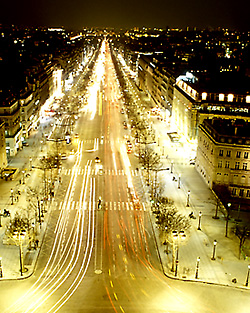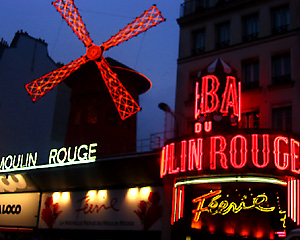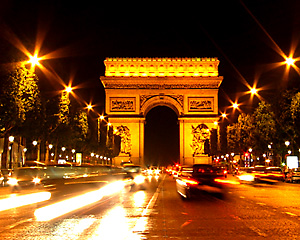Paris: City of Light and Literary Luminaires
by David Yeadon
Quite frankly, I'm absolutely "gobsmacked," which is, for those not fortunate enough to be born in the wilds of northern England, the Yorkshire dialect for I am totally, outrageously amazed, maxed-out, that the hasty scribblings in my notebook are actually mine. Looking through these notes from my last visit to Paris, the world-beloved City of Light, I find the following, a mere fragment of my many pages:
There's a strangely mystic moment here when dusk finally releases its last amber glow and velvet night eases in over the city. The lights suddenly explode on and in an instant, the rather gray, inert, monolithic buildings become feasts of fabulous colors and forms, a fantasy-world unmatched by any other world city, challenging the heavens in their brilliance. You can almost imagine long-gone architects leaping from their rather cramped subterranean quarters and crying out "Yes, yes this is what our buildings are supposed to look like this is how we saw them in our minds and hearts when we first conceived them!"
And the romance too. Night brings romance as only the French can conceive it when the snarl, splutter and belch of the thrombosised traffic of the boulevards mellows to a soothing hum; when lovers dally expectantly and eager-eyed at sidewalk cafés, wondering about the wonders of the night ahead; when Michelin-starred chefs and their coteries rub their hands in anticipatory glee at the bounteous delights of their culinary creations, and when all the mercurial moods of this unique city, from glitzy masquerade to the grace notes of high culture and true Francophile excellence in the theaters, opera houses and those beloved and bawdy music halls when all this bounteous panoply of hedonistic pleasures suddenly reveals itself for a population ravenously appreciative of sensuality in all its guises then the night truly begins and all the illuminated city becomes bathed in magnificent spectra of lights that luster the sky for scores of miles in every direction . . . .
Let me first emphasize that all this gushing hyperbole can be a little misleading. Some days, to be honest, I'm sick of Paris, primarily because of what it can do to perfectly respectable even adulated writers. (I'm not exactly adulated myself but it happens to me anyway.) Something very strange occurs to literary minds here. It brings out the worst in them, particularly those curmudgeonly, cuss-mongering, cantankerous characters who normally delight in blasting away with verbal vitriol at any (and sometimes every) tourist destination that gets a little uppity in hype and attitude. They delight in downgrading trite, clichéd, bland, and over-ballyhooed attractions and "destinations."
But not in Paris oh no, not here. Not in what many admirers insist is "the world's most beautiful city" and "the city that has so much," in fact everything!"
Here, where tourists flock like ravenous summer mosquitoes to bare flesh; here where attitude is all (try speaking your schoolboy French to a Parisian and you'll find out, lickety split). Here, where you must find your way among crazed drivers and rococoed everything and hideously overpriced sybaritic delights here, these titans of tendentious verbiage melt to mush (as I apparently did) and go all gooey and gushy as the charms and enticements of this place lasso their hearts and what's left of their minds and set them scribbling reams of purple-prosed paeans of praise to Paris this insidiously, seductively enticing City by the Seine.
Even the stoic-like Henry James, the legendary and loquacious luminary of 19th century letters, wrote some very un-James-like lines here. Rejoicing in the sunlit hours of the city (apparently he was not a night-man) he oozed: "Day after day the air is filled with golden light and even those chalkish vistas of the Parisian beaux quariters assume the innocent tints of autumn."
 (And, can you believe it even old Mark Twain succumbed too (he was a night-man): "As nightfall approached, excited, delighted, and half-persuaded that we were only the sport of a beautiful dream, lo, we stood in magnificent Paris . . . All the surroundings were gay and enlivening and after dinner we sauntered through the brilliant streets and looked at all the dainty trifles in the beautiful and lavish shops . . . ."
(And, can you believe it even old Mark Twain succumbed too (he was a night-man): "As nightfall approached, excited, delighted, and half-persuaded that we were only the sport of a beautiful dream, lo, we stood in magnificent Paris . . . All the surroundings were gay and enlivening and after dinner we sauntered through the brilliant streets and looked at all the dainty trifles in the beautiful and lavish shops . . . ."
(And this is the man who relished the title of "America's Supreme Satirist"! You'd think he was drafting a two-bit tourist brochure.)
Even Sinclair Lewis, rarely a man to enthuse unnecessarily, has one of the female characters in his novel, Dodsworth, gabble: "Oh look look! Isn't it adorable. Isn't it just too exciting. Oh, the darling funny little zincs (bars)! And the Cointreau ads, instead of chewing gum. Everybody so noisy and yet so gay! Oh, I adore it!"
For a moment the rambunctious wit of America's greatest living humorist, P.J. O'Rourke, brings relief from all the gush: "A lot of people get all moist and runny at the very mention of Paris. I don't get it. It's just a big city, no dirtier than most. The French women here, whether pretty or not, all walk around with their noses in the air (and pretty big noses they usually are). And Parisians never deign to understand a word you say in their own language, no matter how loud or how often you pronounce it."
But alas I surrender when the great British acerbic man's-man, Sir Fitzroy MacLean, gets all sloppy: "Ah — and then all the different lights and colors and smells and noises of Paris at night! The best-dressed women, the best food, the best wine, the best brandy in the world . . .the rattle and bang of the cancan; the plump thighs of the dancers in their long black silk stockings . . .it's a most agreeable existence here in the city . . . ."
The problem, basically, is that too many of the 20th century's revered literati settled themselves here in delight like prankish school kids and implanted I LOVE PARIS stickers on the hearts of all who read their works. Hemingway, Fitzgerald, Gertrude Stein, D.H. Lawrence, James Joyce, Henry Miller et al all became de facto ex-pat Parisians.
So who the heck am I to tank the trend. Maybe there's something to be said for the remarks of a guidebook writer: "Paris deserves a much better break than seven or eight out of ten transatlantic visitors can offer it . . .the city unravels only for the tourist who unwinds . . . ." And even Sinclair Lewis, in more sober mood, recognized the strange allure and magic of the city: "There is another Paris, stately, aloof, gray with history, eternally quiet at its heart for all the superficial clamor."
Unwinding is fine here, I can do that, but I take issue with the "grayness" of Parisian history. Admittedly the city's origins were a bit down at heel when Julius Caesar easily conquered the Parissi tribe, a bunch of ne'er do well layabouts living a very swampy existence on an island in the middle of the Seine. But from that moment on when the Romans started building temples, forums, and all those other urban accouterments, the city has rarely, if ever, looked back. The cathedral of Notre-Dame arrived the end of 10th century, then the Louvre and other fabulous museums, followed by the Palace of Versailles, a binge of boulevardism and the Arc de Triomphe under the Napoleons, the 1889 Eiffel Tower, and more recently the genius of the Pompidou Center, The Forum des Halles, and I.M. Pei's glass pyramid addition to the Louvre, plus dozens of other post-moderne curiosities.
 Anyway back to those Parisian nights . . .back to the glorious theaters, restaurants, operas, concerts, gaudy girly shows at the old favorites The Crazy Horse, Moulin Rouge, Folies-Bergére and The Lido, ever-changing discotheques, the Piaf and Brel-wannabe hangouts, and a myriad jazz and rock clubs. But it's not so much the abundance of nightlife that first entrances you if you're a neophyte here (you expect that) it's the night-lights, those fabulously brazen yet subtle and enticing illumination displays extending across the whole city as far as the eye can believe. Here I am again in this bedazzling (yes I guess I do mean it) city, panting like a pampered poodle at all the night-places to walk, the vistas to ogle at, and the myriad primped and polished glories of a city that looks pretty impressive by day but become a downright fantasyland in the dark hours. And let's face it, the Parisians know exactly what they're doing when they turn their city into this vast son et lumiére show (yes, they invented that too) that leaves you gasping at the audacity and extravagance of it all the magnificent extravagance of billions of lights that transform all the familiar landmarks the Louvre, Notre-Dame, La Place de la Concorde, the Bastille, Eiffel Tower, the Pont-Neuf, the Seine itself . . .into brilliant technicolor tumults of shapes and colors. And as you zoom in closer you see superb statues, clusters of cute cherubs, ornate cupolas, richly-carved Corinthian columns, elegantly-sculpted doorways, and exquisite bas-relief friezes that, during the push-rush day, you never even notice. It makes you want to stay out all night, to wander (preferably with someone you love) in the Bois de Bologne, the Tuilleries Gardens, along the serpentining Seine, down the grand Champs-Elysées, the Rue de Rivoli, into the Place Vendome, and on to the 1861 Opéra which boasts the largest stage on earth.
Anyway back to those Parisian nights . . .back to the glorious theaters, restaurants, operas, concerts, gaudy girly shows at the old favorites The Crazy Horse, Moulin Rouge, Folies-Bergére and The Lido, ever-changing discotheques, the Piaf and Brel-wannabe hangouts, and a myriad jazz and rock clubs. But it's not so much the abundance of nightlife that first entrances you if you're a neophyte here (you expect that) it's the night-lights, those fabulously brazen yet subtle and enticing illumination displays extending across the whole city as far as the eye can believe. Here I am again in this bedazzling (yes I guess I do mean it) city, panting like a pampered poodle at all the night-places to walk, the vistas to ogle at, and the myriad primped and polished glories of a city that looks pretty impressive by day but become a downright fantasyland in the dark hours. And let's face it, the Parisians know exactly what they're doing when they turn their city into this vast son et lumiére show (yes, they invented that too) that leaves you gasping at the audacity and extravagance of it all the magnificent extravagance of billions of lights that transform all the familiar landmarks the Louvre, Notre-Dame, La Place de la Concorde, the Bastille, Eiffel Tower, the Pont-Neuf, the Seine itself . . .into brilliant technicolor tumults of shapes and colors. And as you zoom in closer you see superb statues, clusters of cute cherubs, ornate cupolas, richly-carved Corinthian columns, elegantly-sculpted doorways, and exquisite bas-relief friezes that, during the push-rush day, you never even notice. It makes you want to stay out all night, to wander (preferably with someone you love) in the Bois de Bologne, the Tuilleries Gardens, along the serpentining Seine, down the grand Champs-Elysées, the Rue de Rivoli, into the Place Vendome, and on to the 1861 Opéra which boasts the largest stage on earth.
And then comes the intimate bohemia of the Left Bank and Latin Quarter neighborhoods around the Sorbonne, the magnificent Panthéon, and the Musée d'Orsay, and further out to the beloved basilica of Sacre-Coeur in Monmartre, whose elegantly-illuminated cupolas provide an ornate foil for the elongated white dome (oh-so popular subject with Impressionists) and 260' high bell tower containing the Savoyarde, one of the most massive bells in the world. From here the whole city lies before you sparkling like vast sprinklings of tiaras against a backcloth of black velvet. Night is indeed magic in this most magical of all cities and despite my writer-reservations about not allowing any object or destination to seduce me into uncharacteristically ebullient prose I can't think of any other place I'd rather be right now than sitting in this street café in the gorgeous Place de Vosges (one of the most perfect plazas in the city and of course superbly illuminated too), sipping a sweet aperitif, wondering where to dine this evening, smiling at a charming girl at an adjoining table (no, her nose is not raised), and leaning back to admire the lights the lights in this oh-so rightly named City of Light. And if I listen carefully, really carefully, I can hear, as Sinclair Lewis described, the "eternally quiet heartbeat" of Paris beneath all the gorgeous dazzle and dizziness of its myriad distractions and oh-so marvelous miasma of mesmerizing magic . . . ." (Oh boy here I go again . . . .)

